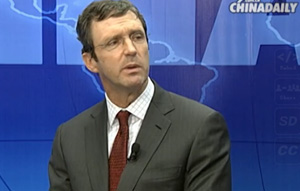Religious extremists
Updated: 2013-11-27 06:39
(China Daily)
|
||||||||
Religious extremism has been threatening global security and peace since the Sept 11, 2001, attacks on the US and has become a matter of grave concern for the international community. In China's Xinjiang Uygur autonomous region, religious extremism, combined with ethnic separatism, has resulted in a series of violent terrorist attacks threatening national security and social stability, says an article in Xinjiang Daily. Excerpts:
Religious extremism started spreading in Xinjiang in early 20th century when ethnic separatists systematically absorbed Pan-Islamism to come up with a political program of ethnic separatism. In the 1980s, Afghanistan became the base of a new radical Islamic movement. The penetration and spread of radical Islam, combined with ethnic separatism in Xinjiang, gave birth to the notorious political program of religious nationalism.
In the early 1990s, following the disintegration of the Soviet Union, nationalism and religious extremism resurfaced in the newly independent countries of Central Asia, which Xinjiang's separatist forces saw as an encouraging sign. They tried to incite religious fanaticism by indoctrinating youths with extreme religious teachings to train their so-called successors to expand the social foundation of ethnic separatist forces.
The result was a slew of destructive activities carried out by ethnic separatist forces and terrorists, seriously endangering social and political stability. The religious extremists have since then tried in vain to split the country by launching violent terrorist attacks. Under the cloak of religion, the extremist forces have incited the people against "pagans", provoked ethnic tensions and given a call for a "holy war" to overthrow the government and establish theocracy in Xinjiang.
By distributing reactionary religious books and audio-visual products among the people, the religious extremists have been trying to split Xinjiang from the motherland. Religious extremism in Xinjiang has been serving as a sort of "spiritual" weapon for separatist and terrorist activities.
Religious extremism has had a destructive effect in China as well as in other parts of globe. First, it has severely impaired national security and territorial integrity. In the 1990s, separatist forces in some countries used the cloak of religion to win over people to their side with the aim of dividing countries by launching violent terrorist attacks and even covert but organized "military" action. Such violent activities pose a direct threat to the sovereignty and territorial integrity of many countries. The Chechnya problem is a typical example in this case.
Religious extremism is by its very nature prone to inciting violence and terror, disturbing a state's normal political, economic and social order. Some political forces with ulterior motives have been using religion to fan passions and propagate theocracy with the aim of mixing politics with religion to grab power. All these characteristics find reflection in Xinjiang's religious extremist forces.
Second, religious extremism preach only extremist ideas and endanger the normal social order; it is not at all conducive to economic and social development. Religious extremism is strongly opposed to the modern state and the prevailing economic system. It does not recognize the existence of the state, claiming that the modern state does not conform to Islamic law. Such thoughts and actions not only undermine the normal order of social production, but also hinder the healthy development of the economy.
Third, the spread of religious extremism harms the harmony among ethnic groups. In Xinjiang, religious extremists claim religion is the sole criterion that divides ethnic groups. By strengthening pseudo religious consciousness and a false sense of belonging, they want people to fall prey to religious extremism, which would lead to antagonism among ethnic groups and undermine national unity.
Islamic extremists demonize non-Islamic nations, describing them as infidels and exploiters. They have made it their religious obligation to carry out "jihad" against non-Islamic nations in order to realize their narrow goals. In addition, they slander followers of Islam who are patriots by portraying them as infidels and scum of the earth (in other words, traitors) to isolate them and drive a wedge between communities.
Fourth, religious extremists and their activities disrupt normal religious activities and undermine solidarity. Religious extremists use various means to spread extremist ideas and incite religious fanaticism, causing internal divisions and confrontations. By misguiding people with their religious teachings, religious extremists try to force them to take the path of violence and terrorism, which goes against the spirit of all religions.
Within their own religion, religious extremists use obscurantist theories to drive a wedge among different sects that result in intra-religious divisions. They try to mix up legal and illegal religious activities, and create an illusion that the government is oppressing the followers of a certain religion to arouse sympathy and draw support from believers in other countries in order to achieve their ulterior motives. And these religious extremists don't hesitate to even assassinate patriotic religious leaders in their vain attempt to seize religious leadership.
(China Daily 11/27/2013 page9)
Most Viewed
Editor's Picks

|

|

|

|

|

|
Today's Top News
Brooklyn, Shanghai hook up
Air zone said not to affect routine flights
EU demands protection against US surveillance
China, Romania call ties 'exemplary'
First Web anti-monopoly lawsuit begins trial
Qualcomm in anti-monopoly probe
US troops pullout in Afghanistan
Li looks to closer relations
US Weekly

|

|














